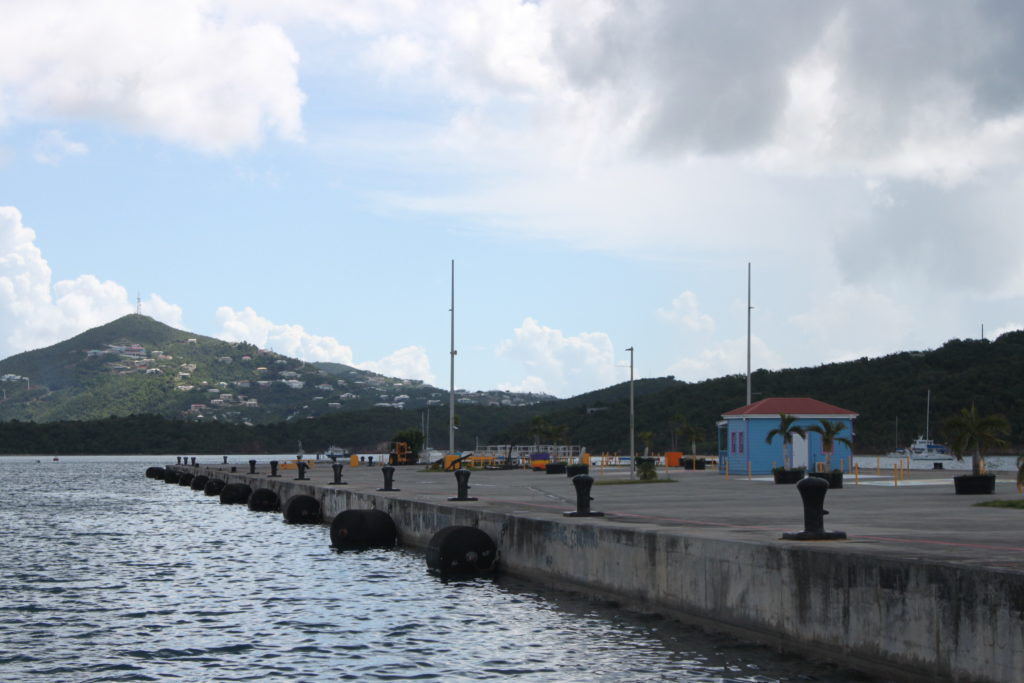
COVID-19 is wreaking havoc on all Port Authority operations, from the airports to the cruise ship terminals to interisland ferry services, members of its governing board learned on Wednesday at their monthly meeting, held via Zoom.
“It would be an understatement to say these are challenging times for all – the Port Authority is no different,” said Executive Director Carlton Dowe.
Tenants at the agency’s Crown Bay terminal on St. Thomas are seeking rent relief as business has dried up since cruise ships stopped calling in March. Ferry operators between Red Hook and Cruz Bay on St. John are asking who will compensate them for running at half capacity due to social distancing rules. And service to the British Virgin Islands has been halted due to that nation closing its borders, affecting tenants at the Edward Wilmoth Blyden IV Marine Terminal in Charlotte Amalie.
“Our maritime sector continues to take a full hit. … It is a challenge,” said Dowe.
The extent of that hit was outlined by Chief Financial Officer Anna Penn. From the start of the fiscal year on Oct. 1 to June 30, the Port Authority has accrued an operating loss of $8.9 million, Penn told the board – a $13 million loss when compared to fiscal year 2019.
Accounts receivable totaled $8,107,395 at the end of June, according to Penn’s report. While some of those amounts due to the Port Authority were outstanding since before the start of the pandemic, others are due to the strain COVID-19 has created for tenants of the Port Authority, leading to a request by Dowe to extend rent abatement for businesses reliant on cruise ships until sailing resumes.
Crown Bay tenants received deferment letters from Dowe at the start of the pandemic in March, waiving late and financial fees and offering rental deferment for four months, with the stipulation that they apply for all available government assistance and, if received, pay rent due. Follow-up letters were sent in June, telling tenants that “now is the time to make well on their payments” that are outstanding from before the virus, property manager Diane Washington told the board. “It’s a work in progress,” she said. “We are going after those we think we can collect from at this point.”
“Most of the businesses in Crown Bay are based on ship calls to the Crown Bay dock,” Washington added, raising questions from board member Celestino White Sr. as to whether the deferments should extend to tenants affected by the closure of the British Virgin Islands.
After some discussion, the board passed two motions – one agreeing to deferments for Crown Bay tenants directly affected by the cessation of cruise ship calls, and a second allowing rent abatements for businesses interrupted by the closure of the British Virgin Islands. Both motions stipulate that accounts must have been “in good standing” prior to April.
The pandemic’s financial fallout has intensified the Port Authority’s bid to diversify its tenant base by recruiting businesses that are not solely dependent on ship traffic, Dowe said. “We have some new businesses we expect to be coming in that are not reliant on cruise ships. We have several in the wings” that are not jewelry stores, he said.
According to Washington’s report, the Port Authority has negotiated leases with the Public Finance Authority/Office of Disaster Recovery, as well as a full-service beauty spa. A permit also is being finalized by the legal department with a prospective tenant for a bar and grill at the Mill at Crown Bay. Discussions also are underway with other government agencies for office space and lease/permit negotiations for spaces with private businesses such as hair salons, car rentals, bicycle rentals, business offices, restaurants and medical services are ongoing.
The Port Authority also is diversifying its banking business, with the board voting to approve entering a relationship with Merchants Bank that will allow VIPA to pursue a Certificate of Deposit. Currently, the Port Authority does business with Banco Popular and FirstBank. Like most banks, they are FDIC-insured up to $250,000 per depositor, which left the Port Authority with a significant uninsured portfolio, Dowe noted.
The board also voted Wednesday to approve a $7 million line of credit for a term of three years with Banco Popular, with a Certificate of Deposit as collateral. Dowe noted that Banco holds millions of dollars in Port Authority funds. “Banking is about relationships,” he said. “We will be prepared to be aggressive” in asking banks to step up when the need arises.





